Intro
This article is all about “Heart Failure: Key Facts You Need to Know.” Heart failure is a serious illness that affects billions of people worldwide It is a chronic condition where the heart is unable to pump enough blood to meet the body’s needs. This can lead to a variety of symptoms and complications, making it important to understand the key facts about heart failure in order to effectively manage and treat it.
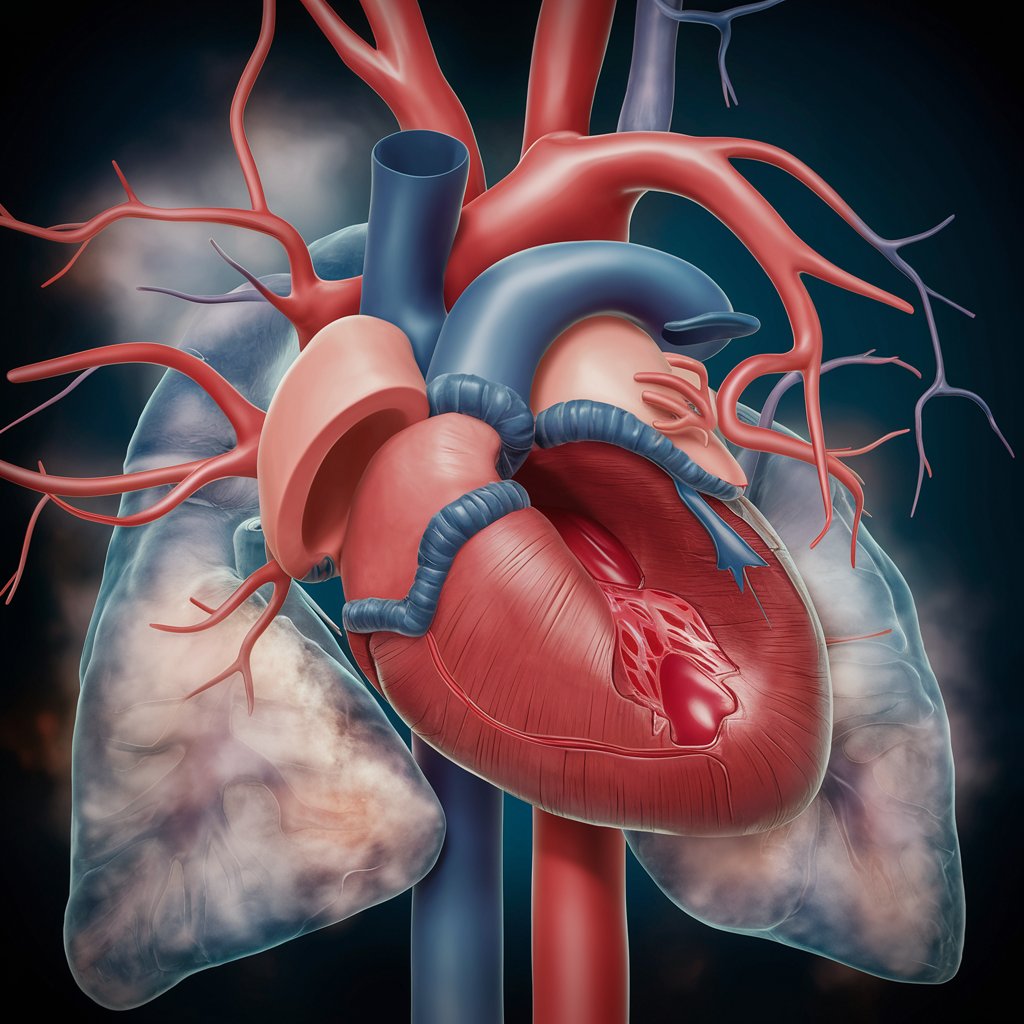
What is Heart Failure and How Does It Occur?
Imagine your heart as a dedicated, hardworking pump in the center of your body’s universe, tasked with the crucial job of circulating blood to every corner, ensuring oxygen and nutrients reach where they need to go. Now, picture what happens when this pump isn’t working as efficiently as it should. This scenario paints the essence of heart failure – a condition not where the heart stops, but where it struggles to meet the body’s demands.
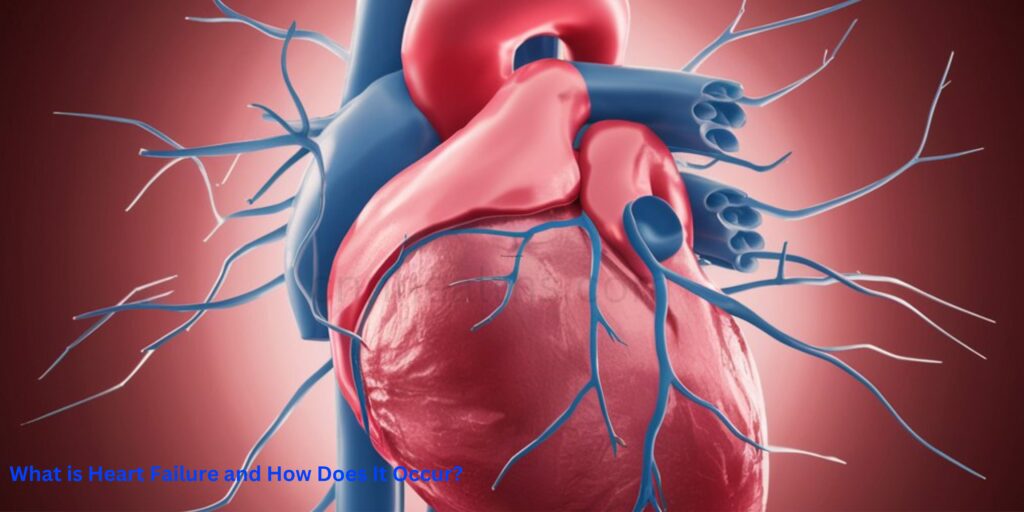
At its core, heart failure is a result of various factors that compromise the heart’s ability to perform its vital role. Think of it as the outcome of cumulative damage or stress to the heart muscle, which can stem from several sources. For instance, a heart failure can leave the heart weakened, struggling to recover its full pumping prowess. Likewise, conditions like high blood pressure put extra strain on the heart, forcing it to work harder than normal, which can gradually wear it down.
Other contributors include diseases that either affect the heart muscle directly, such as cardiomyopathy, or conditions that impose additional burdens on the heart, like diabetes. The heart, remarkable as it is, has its limits. When pushed beyond these limits by disease or damage, it begins to falter, leading to the symptoms and complications associated with heart failure.
Understanding the “how” and “why” behind heart failure is crucial. It’s not simply a singular event but a complex interplay of factors that diminish the heart’s efficiency. By grasping these underlying causes, we’re better positioned to prevent, manage, and navigate the challenges heart failure presents, reinforcing the importance of heart health in our lives.
Common Causes and Risk Factors of Heart Failure
Delving into the heart of the matter, understanding the common causes and risk factors for heart failure is akin to mapping the terrain of a complex landscape. Imagine each risk factor as a different path that might lead to the same challenging destination: heart failure. At the forefront, coronary artery disease, high blood pressure, and diabetes form the main highways. These conditions act like relentless pressures on the heart, sometimes eroding its strength over time.
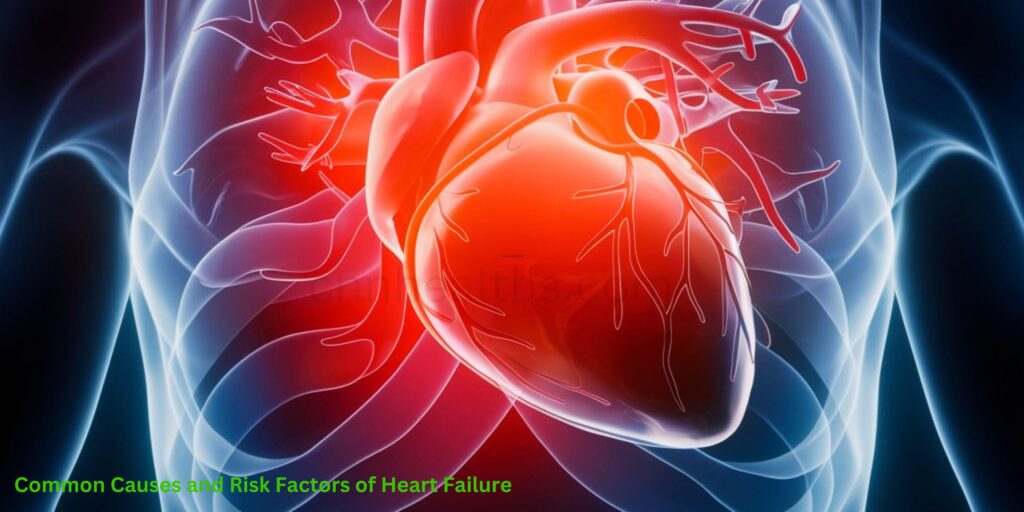
Venturing further into this terrain, we encounter lifestyle choices and genetic blueprints that can also guide us toward heart failure. Obesity and searing, for example, are like detours that can unexpectedly accelerate one’s journey towards heart failure. They add extra burden to the heart, akin to carrying a heavy backpack on a long hike, making each step harder for the heart.
Then there’s the aspect of inheritance – a family history of heart disease. Like a handed-down map that shows a predisposed route, genetics can play a significant role in one’s susceptibility to heart failure. It’s as if the heart’s destiny is partially written in the stars of one’s genetic makeup, highlighting the importance of vigilance and preventive measures for those with heart disease running in their families.
Navigating through the landscape of heart failure causes and risk factors isn’t just about recognizing the signposts; it’s about understanding how each factor interacts with the others, creating a web of influences that affect the heart. By acknowledging and addressing these risk factors, individuals can take proactive steps to protect their heart, charting a course towards a healthier future.
Recognizing the Symptoms of Heart Failure Early
Embarking on the journey of understanding heart failure, one of the most pivotal steps is recognizing its symptoms early on. Imagine your body sending you signals, like a lighthouse warning ships of the shoreline in the dark. These signals – symptoms of heart failure – can vary from subtle whispers to loud cries for attention, but all are crucial indicators that your heart may need some help.

Shortness of breath isn’t just an inconvenience; it’s like your body gasping for air, trying to tell you that your heart is struggling to pump efficiently. Similarly, feeling unusually fatigued isn’t merely about being tired; it’s as if your body is running a marathon with no finish line in sight, highlighting the heart’s reduced capacity to support your body’s needs.
Swelling in the legs and feet, known as edema, can feel like your body is holding onto water like a sponge. This happens when the heart’s pumping power is compromised, leading to fluid buildup. And a persistent cough or wheezing, which might seem unrelated, can actually be a covert sign of heart failure, especially if it worsens when lying down or during physical exertion.
Heeding these signals and seeking medical evaluation promptly can be a game-changer in managing heart failure. It’s like decoding a message from your body, enabling you and your healthcare provider to chart the best course forward. Remember, recognizing and responding to these early symptoms is a critical step in navigating the journey of heart health with confidence and care.
Diagnostic Tests and Procedures for Heart Failure
When embarking on the journey to understand and manage heart failure, think of diagnostic tests and procedures as the map and compass guiding your way through uncharted territory. These essential tools help healthcare professionals peek into the workings of your heart, offering insights and clarity on how well it’s performing its vital role.
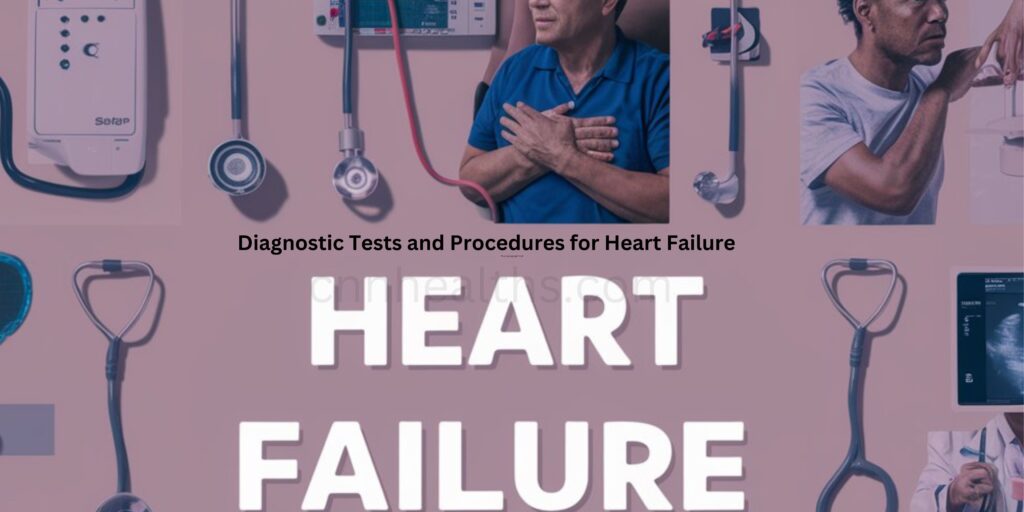
One of the first stops on this exploratory journey often involves an echocardiogram, a non-invasive test that uses sound waves to create moving pictures of the heart. It’s akin to having a high-definition video, showcasing how your heart muscle and valves are working in real-time. Then there’s the electrocardiogram (EKG or ECG), a quick and painless test that records the electrical activity of the heart. It’s like listening to the heart’s unique rhythm, ensuring the beat goes on smoothly and without interruption.
Blood tests also play a pivotal role, acting as the body’s messengers, revealing any tell-tale signs of heart failure or underlying conditions. Think of them as the scouts, bringing back crucial information from the hostile field that is your body. These tests can spotlight issues like abnormal levels of substances in the blood that might indicate heart failure.
Each test and procedure is a step forward on the path to a clearer understanding of your heart health. They equip you and your healthcare team with the necessary information to tailor a treatment plan that’s as unique as you are, illuminating the road ahead with hope and direction.
Treatment Options and Medications for Heart Failure
Navigating the path of heart failure treatment is akin to setting out on a personalized journey, with each step tailored to fit your unique heart story. The treatment landscape is rich and varied, offering a palette of options designed to support your heart’s health and enhance your quality of life. From the cornerstone of lifestyle adjustments to the precision of medication regimes, each treatment option plays a critical role in managing heart failure.

Embarking on this journey often begins with lifestyle modifications, laying the foundation for a healthier heart environment. But when these changes need a boost, medications step into the spotlight. These aren’t just any pills or injections; they’re carefully chosen allies in your struggle against heart failure. Think of ACE inhibitors, beta-blockers, and diuretics as your heart’s personal trainers, working diligently to lower blood pressure, reduce strain, and flush out excess fluid, respectively.
For some, the journey might require more advanced interventions. Enter the realm of medical devices and surgical procedures, where science meets innovation. Devices like pacemakers and defibrillators are akin to skilled navigators, guiding your heart’s rhythm back on course. In cases where the heart’s chambers need structural support, procedures such as valve repair or replacement can be life-altering, restoring the heart’s efficiency and resilience.
Each individual’s path through heart failure treatment is as distinctive as their heartbeat. With a collaborative healthcare team, an informed approach, and a sprinkle of courage, navigating the treatment options for heart failure can lead to a brighter, healthier horizon, where every step forward is a victory.
Lifestyle Changes to Manage Heart Failure Effectively
Embarking on the journey to manage heart failure might seem daunting, but envisioning it as a path towards a healthier heart can make all the difference. Incorporating lifestyle changes into your daily routine is like charting a course for smoother seas, navigating away from the stormy weather of heart failure symptoms.

Imagine transforming your diet into a palette of heart-healthy foods—rich in fruits, vegetables, lean proteins, and whole grains. This isn’t just about eating differently; it’s about savoring flavors that nourish your heart and energize your body. Regular physical activity, tailored to your abilities and heart’s needs, acts as the wind in your sails, propelling you forward with increased endurance and strength.
Consider the act of quitting searing as casting off a heavy anchor that’s been dragging you down, freeing your heart to beat stronger and healthier. Simultaneously, managing stress through mindfulness or relaxation techniques is akin to navigating through calm waters, offering your heart a respite from the turbulent waves of everyday life.
These lifestyle adjustments are not mere changes but powerful tools in your arsenal against heart failure. Like a compass guiding you through unknown territories, these practices point towards a horizon where your heart’s health can flourish. Stepping into this journey with determination and optimism can illuminate the path towards not just managing heart failure, but thriving in spite of it.
The Role of Support Networks and Counseling in Heart Failure Management
Journeying through heart failure isn’t a solo expedition; it’s a path best navigated with the company of supportive companions and professional guidance. Envision support networks and counseling as your dedicated crew, each member playing a unique role in ensuring your voyage is less burdensome and more hopeful. Family and friends become the comforting lighthouses, providing light during your darkest hours, while healthcare professionals are the skilled navigators, offering the medical expertise necessary to steer you through rough waters.

Counseling services and support groups offer a sanctuary—a safe harbor where you can share your experiences, worry , and victories with those who truly understand. These interactions are like finding a map filled with the experiences of others who have traversed similar paths, offering valuable insights and strategies for managing the emotional and psychological challenges of heart failure. Here, amidst fellow travelers, you’ll discover that your feelings of isolation dissipate, replaced by a sense of belonging and community.
This ensemble of support not only lifts the weight off your shoulders but also empowers you to face the journey ahead with resilience and grace. By embracing the support of loved ones and the wisdom of counseling, you chart a course toward a more manageable and fulfilling life with heart failure, surrounded by a network of care that fuels your spirit and strengthens your heart.
Advancements in Heart Failure Research and Future Outlook
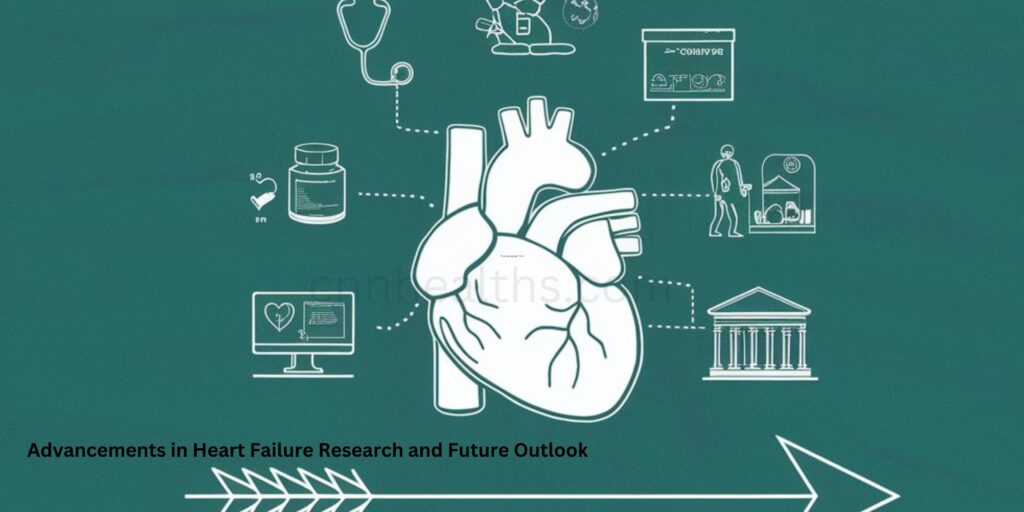
The landscape of heart failure research is constantly evolving, much like a vast and uncharted territory being explored for hidden treasures. Each day, scientists and researchers delve deeper into understanding the intricacies of heart failure, uncovering new ways to enhance the quality of life for those affected by this condition. Exciting developments are on the horizon, from innovative medications that promise more precise targeting of heart failure symptoms to cutting-edge devices designed to support the heart’s function more effectively. The potential for regenerative medicine, including stem cell therapies, offers a glimpse into a future where damaged heart tissue could be repaired or even regenerated. This ongoing quest for knowledge and solutions holds the promise of transforming the heart failure landscape, offering hope and a brighter outlook for millions. As we continue to support and invest in heart failure research, we move closer to a world where managing heart failure is not just about survival but thriving, painting a future filled with possibilities for heart health and wellness.

